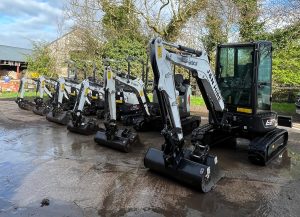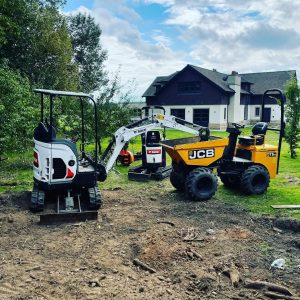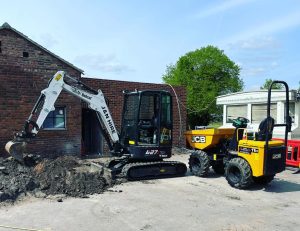Mini diggers and excavators are powerful tools that have revolutionized the way construction, landscaping, and excavation projects are carried out. These versatile machines are capable of digging trenches, moving heavy materials, and performing a variety of tasks with precision and efficiency. However, operating mini diggers and excavators comes with inherent risks, and ensuring the safety of operators and bystanders is paramount. In this blog post, we’ll explore essential safety measures to follow when operating mini diggers and excavators to minimize the risk of accidents and injuries on the job site.
- Proper Training and Certification: The first and most crucial safety measure when operating mini diggers and excavators is ensuring that operators are properly trained and certified. Operating these machines requires specialized skills and knowledge of safety protocols. Operators should undergo comprehensive training programs that cover equipment operation, safety procedures, and emergency protocols. Certification ensures that operators are competent of safely operating mini diggers and excavators in various conditions.
- Perform Pre-Operation Inspections: Before starting any work with a mini digger or excavator, operators should perform thorough pre-operation inspections to ensure that the machine is in proper working condition. Inspections should include checking for leaks, inspecting hydraulic hoses and fittings, testing controls and safety devices, and examining the condition of tyres or tracks. Any issues or abnormalities should be addressed promptly to prevent accidents or equipment failure during operation.
- Maintain a Safe Work Zone: Establishing a safe work zone is essential for preventing accidents and minimizing the risk of injury to operators and bystanders. Clearly mark the boundaries of the work area with barricades, cones, or signage to prevent unauthorized entry. Keep bystanders and non-essential personnel a safe distance away from the operating area to avoid potential hazards. Maintaining a clear and organized work zone promotes efficient operations and reduces the likelihood of accidents caused by obstructions or distractions.
- Wear Personal Protective Equipment (PPE): Operators should always wear appropriate personal protective equipment (PPE) when operating mini diggers and excavators. This includes safety helmets, high-visibility vests, gloves, eye protection, and steel-toed boots. PPE helps protect operators from potential hazards such as falling debris, flying particles, and accidental contact with equipment components. Ensuring that all operators are properly equipped with PPE is essential for maintaining a safe working environment on the job site.
- Adhere to Load Capacity Limits: Mini diggers and excavators are designed to handle specific load capacities, and exceeding these limits can result in equipment damage or tip-over accidents. Operators should be aware of the maximum load capacities of their machines and avoid overloading them beyond their rated capacity. Properly distributing the weight of loads and using appropriate lifting attachments can help maintain stability and prevent accidents caused by overloading.
- Use Caution When Maneuvering: Operating mini diggers and excavators requires careful manoeuvring and spatial awareness to avoid collisions and hazards. Operators should use caution when navigating uneven terrain, narrow passages, or congested work areas. Maintain a slow and steady pace when operating the machine, and always be mindful of the surroundings to prevent accidental contact with obstacles, structures, or other equipment.
- Follow Safe Digging Practices: When excavating or digging trenches with mini diggers and excavators, operators must follow safe digging practices to prevent cave-ins, collapses, or utility strikes. Before digging, locate and mark underground utilities using appropriate detection methods. Exercise caution when excavating near buried cables, pipes, or gas lines, and maintain a safe distance to avoid accidental damage or injury. Adhering to safe digging practices helps prevent costly damage and ensures the safety of personnel and property.
- Be Prepared for Emergencies: Despite taking all necessary precautions, emergencies can still occur during operation. Operators should be familiar with emergency shutdown procedures and know how to respond quickly and effectively in the event of equipment malfunctions, hydraulic leaks, or other emergencies. Providing operators with access to emergency stop buttons, fire extinguishers, and first-aid kits can help mitigate the severity of accidents and facilitate prompt response and assistance.
In conclusion, ensuring the safe operation of mini diggers and excavators requires adherence to strict safety protocols, proper training, and vigilant oversight. By following essential safety measures such as proper training and certification, pre-operation inspections, maintaining a safe work zone, wearing PPE, adhering to load capacity limits, exercising caution when manoeuvring, following safe digging practices, and being prepared for emergencies, operators can minimize the risk of accidents and injuries on the job site. Prioritizing safety not only protects personnel and equipment but also contributes to a culture of safety and professionalism in the construction and excavation industry.



